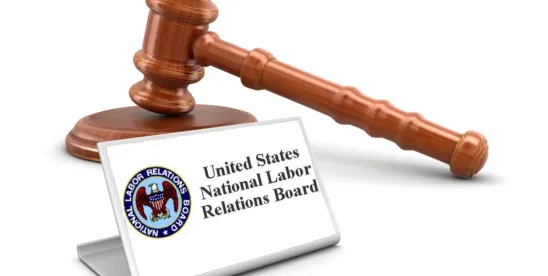National Labor Relations Board (“NLRB”) General Counsel Jennifer Abruzzo recently issued GC Memo 25-01, announcing her view that so-called “stay-or-pay” employment provisions are unlawful, and her intent to urge the Board to expand remedies for non-compete agreements that she deems unlawful.
The General Counsel’s View on Stay-Or-Pay Agreements
A “stay-or-pay” provision generally refers to any contract clause that requires an employee to pay their employer if they separate from employment, either voluntarily or involuntarily, within a certain time-period. Examples highlighted by Abruzzo include:
- Training or education repayment provisions – which require an employee to reimburse their employer for the costs of mandatory training programs or higher education;
- Sign-on or retention bonuses tied to a certain time-period – where an employer offers up-front monetary payment to an employee, but requires the employee to repay the money if they exit within a certain time period; and
- Quit or breach fees – a separation fee that shifts lost profits caused by the employment vacancy from the employer to the employee.
In GC Memo 25-01, the General Counsel argues that these provisions restrict employee mobility by creating a financial exit barrier, and chill employees’ exercise of Section 7 rights by inducing fear of additional financial burden upon termination. The memo sharply criticizes potential business interests for maintaining such provisions, including employee retention and recouping costs associated with employee development.
Under the General Counsel’s proposed legal analysis, any provision which requires an employee to pay an employer upon termination would be presumptively unlawful. The employer would then bear the burden to prove:
- The agreement is truly voluntarily and entered into in exchange for a benefit;
- has a reasonable and specific repayment amount, no more than the cost to the employer;
- has a reasonable “stay” period; and
- does not require repayment if the employee is terminated without cause.
The memo calls for recission and replacement of any provision deemed unlawful, even if an employee entered into the agreement voluntarily and with informed consent. Additionally, employers would be required to forgive any related employee-debt, post an expanded notice, and make employees whole for any missed opportunities similar to the remedies discussed below for non-compete violations.
Employers have until December 6, 2024 to cure any prior pay-to-stay provisions enacted prior to October 7, 2024. Any pay-to-stay agreements created from October 7, 2024 forward are subject to immediate prosecution.
Expanded Remedies For Non-Compete and Pay-to-Stay Provision Violations
Building on GC Memo 23-08 (which we discussed here), the General Counsel also called for significantly expanded remedies for non-compete agreements deemed, in her view, to violate the National Labor Relations Act (the “Act”). The remedy differs based on whether the non-compete provision was simply maintained versus enforced.
First, if the employer is found to have maintained an unlawful non-compete provision, the General Counsel recommends that the Board require the employer to post a notice that:
- Alerts current employees that they may be entitled to compensation if they were discouraged from pursuing or accepting “better” (in terms of pay and benefits) employment due to the non-compete;
- Notifies former employees (who separated from the employer within the six-month statute of limitations or “10(b) period”) that they may be entitled to compensation if the non-compete agreement caused them to remain unemployed longer, accept a lesser-compensated position, move outside the provision’s geographic scope, or incur retraining costs to switch to a job in a different industry; and
- Directs individuals to contact the NLRB regional office during the notice posting period if they meet the criteria above to provide evidence.
The employer would then be required to compensate all impacted employees for these damages during the compliance period.
If the employer enforced an unlawful non-compete provision by bringing a breach of contract or similar claim against the employee, the General Counsel urges the Board to seek dismissal of the action and compensation for any legal fees and costs incurred by the employee.
Takeaways For Employers
GC Memo 25-01 is not binding legal precedent. Rather, it is General Counsel Abruzzo’s vision of how she believes the law should be shaped, and signals that NLRB Regional Offices will begin prosecuting cases in line with the memo. At a minimum, it highlights that employers can expect any non-compete or pay-to-stay provision will be met with heightened scrutiny and the Regional Offices will be pursuing expanded remedies.





 />i
/>i

